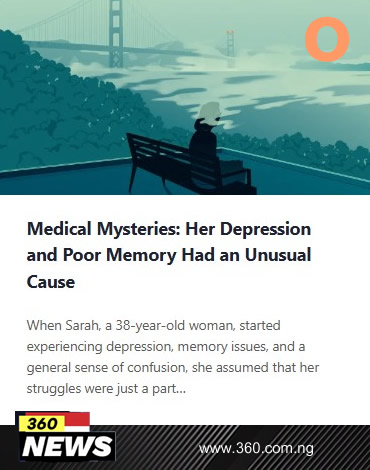Medical Mysteries: Her Depression and Poor Memory Had an Unusual Cause

When Sarah, a 38-year-old woman, started experiencing depression, memory issues, and a general sense of confusion, she assumed that her struggles were just a part of life. Juggling work, family, and personal stress, she figured the feelings were normal.
However, the symptoms worsened over time, and Sarah realized something was not right. Seeking medical help, she discovered the surprising and unusual cause behind her mental health issues—an undiagnosed condition that had quietly been affecting her body for years.
The Onset of Symptoms
For months, Sarah had been feeling unusually forgetful. Simple tasks, like remembering to take her vitamins or scheduling appointments, became increasingly difficult. Her memory felt foggy, and she found herself struggling to concentrate at work. At first, she chalked it up to stress and lack of sleep.
But then, the feelings of depression set in. Sarah, a generally upbeat person, suddenly found herself battling bouts of sadness and irritability. She felt disconnected from her family and friends, something that worried her deeply.
Sarah’s symptoms didn’t improve with time. As her emotional state declined, she began experiencing physical symptoms like fatigue, headaches, and muscle aches.
Her sleep patterns became erratic—she was either sleeping too much or not at all. The memory problems persisted, and the depressive episodes became more frequent.
After consulting with a mental health professional and trying various antidepressants without success, Sarah’s doctors started to suspect there might be an underlying physical cause behind her mental health symptoms.
A Surprising Diagnosis: Vitamin Deficiency
After a series of tests, Sarah’s doctors discovered a surprising culprit—she had a severe vitamin B12 deficiency. This rare but serious condition can cause a variety of neurological and psychiatric symptoms, including memory problems, depression, and confusion.
Vitamin B12 plays a vital role in brain health and nerve function. A deficiency can lead to neurological damage, affecting cognitive abilities, memory, and mood regulation.
In Sarah’s case, the deficiency was so severe that it had begun affecting her ability to think clearly and maintain emotional stability.
It turned out that Sarah had been struggling with an undiagnosed B12 deficiency for years, likely caused by a combination of poor diet and a malabsorption issue in her digestive system.
Despite consuming a relatively balanced diet, her body wasn’t absorbing the vitamins properly, leading to the gradual onset of symptoms.
How Vitamin B12 Deficiency Affects Mental Health
Vitamin B12 is essential for the production of red blood cells, nerve function, and the production of DNA. It also plays a significant role in regulating mood and cognitive function.
When the body does not get enough B12, it can lead to a range of neurological issues, including memory loss, difficulty concentrating, and depression.
In Sarah’s case, the deficiency disrupted her brain’s ability to produce important neurotransmitters like serotonin and dopamine, both of which are linked to mood regulation.
As a result, Sarah experienced symptoms commonly associated with depression, such as irritability, sadness, and emotional numbness.
The cognitive decline she experienced, including poor memory and confusion, was also a direct result of the vitamin deficiency affecting her nervous system.
The Link Between Nutrition and Mental Health
Sarah’s story underscores the critical link between nutrition and mental health. While many people are aware of the impact of diet on physical health, the connection between what we eat and how we feel emotionally is often overlooked.
Nutritional deficiencies, especially in vitamins and minerals essential for brain function, can have a profound impact on mental health.
Vitamin B12 deficiency, while rare in healthy individuals, can be caused by a number of factors, including poor dietary intake (especially among vegetarians or vegans), digestive conditions that impair nutrient absorption, and certain medications.
In Sarah’s case, the deficiency was likely due to a combination of dietary habits and an undiagnosed gastrointestinal condition, which prevented her body from properly absorbing the vitamin.
Treatment and Recovery
Once Sarah’s diagnosis was confirmed, her treatment plan focused on replenishing her vitamin B12 levels through supplements and dietary changes. Initially, she was given B12 injections, which are more effective for quickly raising vitamin levels in the body.
Over time, she was transitioned to oral supplements and encouraged to eat more B12-rich foods, such as meat, dairy products, and fortified cereals.
The recovery process was gradual, but Sarah began to notice improvements in her cognitive function and mood. Within a few weeks of starting treatment, she noticed that her memory was sharper, and her ability to concentrate improved. Her depression symptoms also began to subside as her B12 levels normalized.
While Sarah still faces challenges with managing her mental health, her experience has taught her the importance of paying attention to her body and seeking medical help when something doesn’t feel right.
Raising Awareness of Vitamin Deficiency
Sarah’s story is a reminder of the importance of early diagnosis and treatment when it comes to health issues that can impact mental well-being.
Vitamin B12 deficiency is often misdiagnosed or overlooked, as its symptoms can mimic those of common mental health conditions, such as depression or anxiety.
Doctors and patients alike should be aware of the potential link between vitamin deficiencies and mental health problems.
In addition to B12, other nutrient deficiencies, such as those in vitamin D, folate, and iron, can also contribute to mood disorders and cognitive decline.
For individuals experiencing unexplained depression, memory issues, or mental fog, it may be worth discussing the possibility of a nutritional deficiency with a healthcare provider.
Sarah’s case serves as a reminder of how physical health issues, like vitamin deficiencies, can manifest in unexpected ways, particularly in mental health.
While depression and cognitive decline are often attributed solely to psychological causes, they can also be the result of underlying physical conditions that are treatable. By addressing the root cause, Sarah was able to improve both her mental health and quality of life.
Her story highlights the importance of comprehensive medical evaluations and the need to consider all possible factors—physical, mental, and nutritional—when diagnosing and treating mental health disorders.
As more people become aware of the connection between nutrition and mental health, it’s hoped that conditions like vitamin B12 deficiency will be diagnosed earlier, helping others avoid the prolonged suffering that Sarah endured.
Picture News







